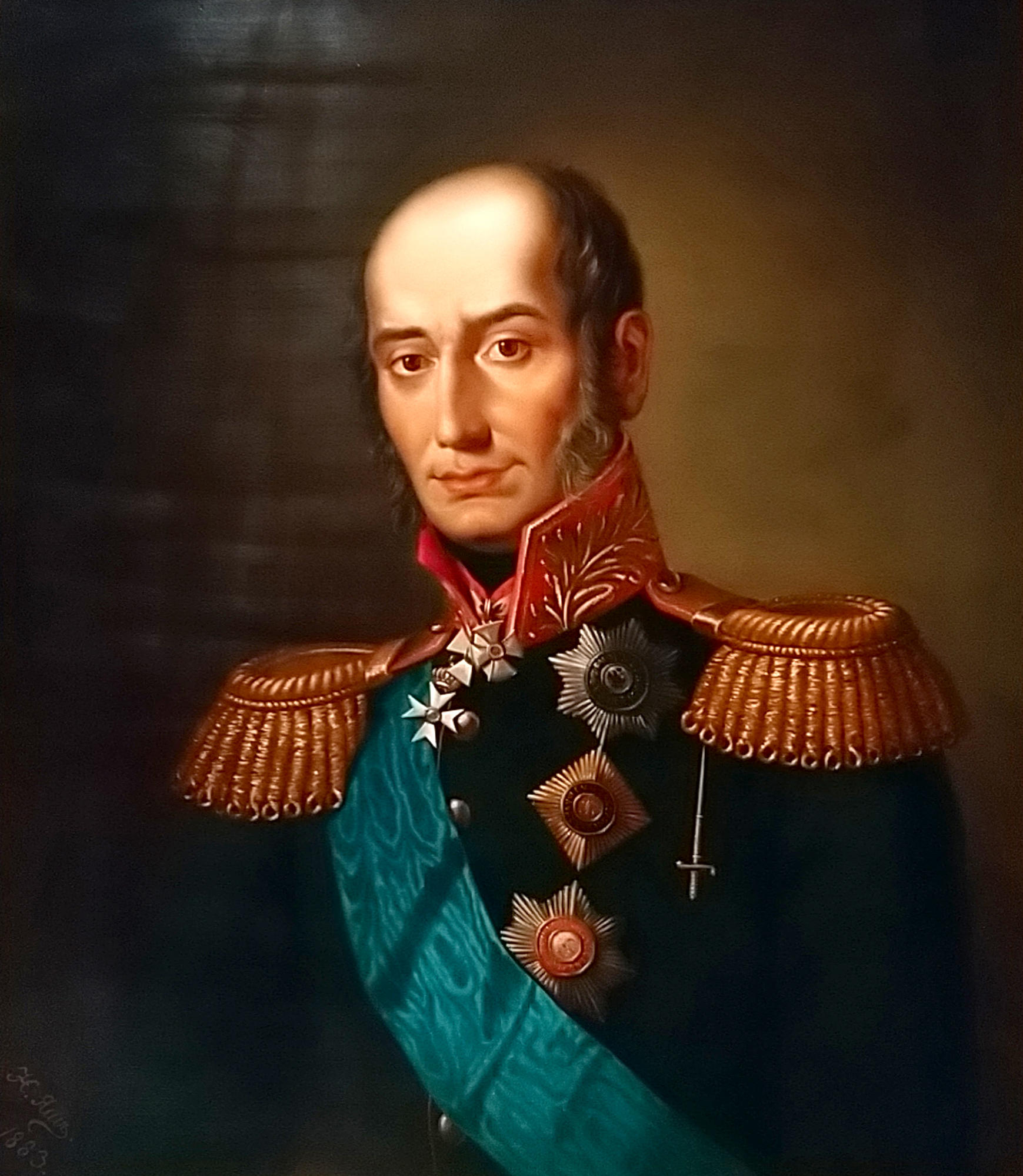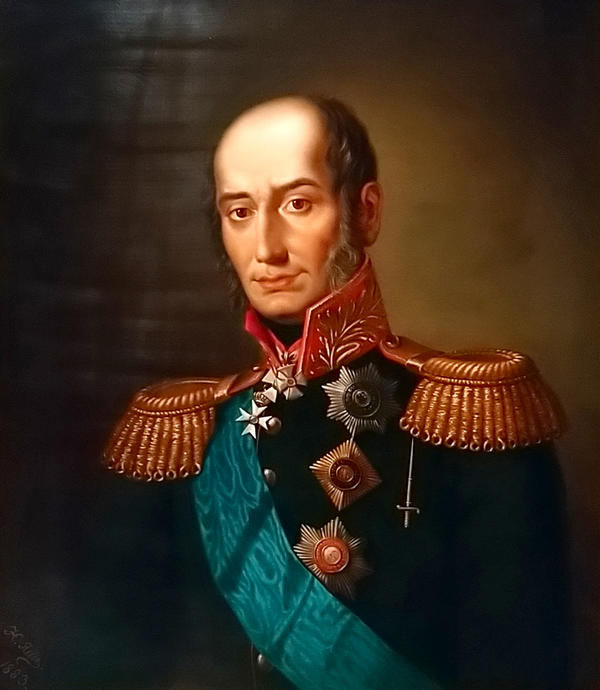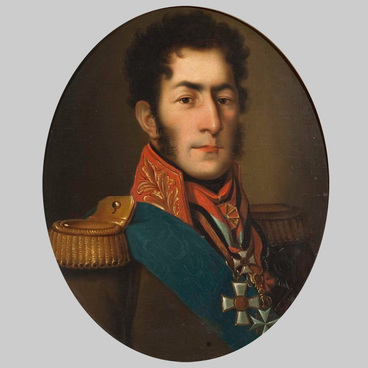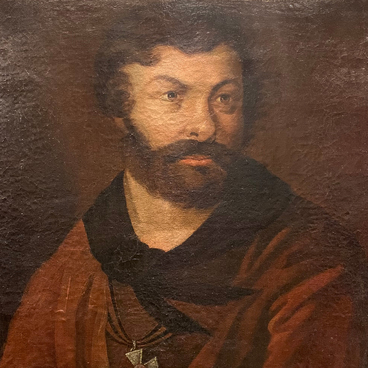Michael Andreas Barclay de Tolly, in Russia Mikhail Bogdanovich Barclay de Tolly (1757-1818), was Field Marshal General and Prince. Barclay de Tolly was an outstanding commander, participant in the Napoleonic wars.
Mikhail Barclay de Tolly remains one of the most controversial figures of his time. The Barclay clan has Scottish and German roots, which largely explains the balanced, restrained and self-confined nature character of the hero, and the antipathy his colleagues had for him. In his notes, General A.P. Ermolov says: ‘Barclay de Tolly […] aroused envy in many and had his ill-wishers. His cold manners brought him neither the liking of equals, nor the commitment of his subordinates’.
He fought alongside Suvorov, made war against with the Turks and Swedes. Barclay’s crossing the Kvarken Strait forever went down in history as unprecedented. In severe frost, without stopping to rest, his detachment strode along the ice of the Gulf of Bothnia for 18 hours in a row, having passed 60 miles. Barclay praised the unwavering steadfastness of the soldiers and later wrote: “The toil of this passage could be sustained only by Russians”.
Barclay de Tolly carried out reforms, and together with Alexander I he developed the concept of a future war with the French. Due to the numerical superiority of the enemy, the campaign plan of 1812 was based on the strategy of the main forces of the Russian army retreating inland and exhausting the enemy.
It was in those days that Mikhail Bogdanovich felt rejection: people openly shied away from him and scolded him behind his back, considering the hated foreigner a Livonian upstart and the Emperor’s favorite. He began the war of 1812 as the commander of the 1st Western Army, and after the retreat, people’s attitude towards him changed from bad to openly aggressive.
In the battle of Borodino, the general led the right wing and center of the Russian troops, showing tremendous personal courage. Eyewitnesses believed that Mikhail Bogdanovich deliberately sought enemy bullets, being unable to bear bullying and damnations. On that day, five horses were killed under him.
The mortally wounded, brave Bagration before his death found the strength to bless the courageous opponent. He asked to tell General Barclay that the fate of the army and its salvation depended on him.
After Borodino, de Tolly, of course, rehabilitated himself in the eyes of those around him, but it could not wash away the bitterness and longing that settled in his suffering soul. In addition, the merger of the 1st and 2nd Western armies literally left him on the sidelines. The resignation was not long in coming. Having traveled with the army along the entire difficult military route from Vilna to Tarutino, the commander left the troops in early October.
When the general’s carriage appeared in sight, the commoners shouted insults, called him a coward, a traitor, and threw stones. He was a stranger to everyone. But soon, the Emperor remembered the courageous commander and returned him to the army. In March 1814, Barclay de Tolly received the title of Field Marshal.
The severe trials undermined Barclay de Tolly’s health. Having gone for treatment at the insistence of doctors in 1818, he died on the way and was buried in Estonia. The motto of the Field Marshal, engraved near the coat of arms of his family, reads: Loyalty and Patience. These simple words completely and comprehensively reflect the principles that Mikhail Bogdanovich adhered to his whole life, though he was not understood by society and therefore rejected.
Mikhail Barclay de Tolly remains one of the most controversial figures of his time. The Barclay clan has Scottish and German roots, which largely explains the balanced, restrained and self-confined nature character of the hero, and the antipathy his colleagues had for him. In his notes, General A.P. Ermolov says: ‘Barclay de Tolly […] aroused envy in many and had his ill-wishers. His cold manners brought him neither the liking of equals, nor the commitment of his subordinates’.
He fought alongside Suvorov, made war against with the Turks and Swedes. Barclay’s crossing the Kvarken Strait forever went down in history as unprecedented. In severe frost, without stopping to rest, his detachment strode along the ice of the Gulf of Bothnia for 18 hours in a row, having passed 60 miles. Barclay praised the unwavering steadfastness of the soldiers and later wrote: “The toil of this passage could be sustained only by Russians”.
Barclay de Tolly carried out reforms, and together with Alexander I he developed the concept of a future war with the French. Due to the numerical superiority of the enemy, the campaign plan of 1812 was based on the strategy of the main forces of the Russian army retreating inland and exhausting the enemy.
It was in those days that Mikhail Bogdanovich felt rejection: people openly shied away from him and scolded him behind his back, considering the hated foreigner a Livonian upstart and the Emperor’s favorite. He began the war of 1812 as the commander of the 1st Western Army, and after the retreat, people’s attitude towards him changed from bad to openly aggressive.
In the battle of Borodino, the general led the right wing and center of the Russian troops, showing tremendous personal courage. Eyewitnesses believed that Mikhail Bogdanovich deliberately sought enemy bullets, being unable to bear bullying and damnations. On that day, five horses were killed under him.
The mortally wounded, brave Bagration before his death found the strength to bless the courageous opponent. He asked to tell General Barclay that the fate of the army and its salvation depended on him.
After Borodino, de Tolly, of course, rehabilitated himself in the eyes of those around him, but it could not wash away the bitterness and longing that settled in his suffering soul. In addition, the merger of the 1st and 2nd Western armies literally left him on the sidelines. The resignation was not long in coming. Having traveled with the army along the entire difficult military route from Vilna to Tarutino, the commander left the troops in early October.
When the general’s carriage appeared in sight, the commoners shouted insults, called him a coward, a traitor, and threw stones. He was a stranger to everyone. But soon, the Emperor remembered the courageous commander and returned him to the army. In March 1814, Barclay de Tolly received the title of Field Marshal.
The severe trials undermined Barclay de Tolly’s health. Having gone for treatment at the insistence of doctors in 1818, he died on the way and was buried in Estonia. The motto of the Field Marshal, engraved near the coat of arms of his family, reads: Loyalty and Patience. These simple words completely and comprehensively reflect the principles that Mikhail Bogdanovich adhered to his whole life, though he was not understood by society and therefore rejected.



